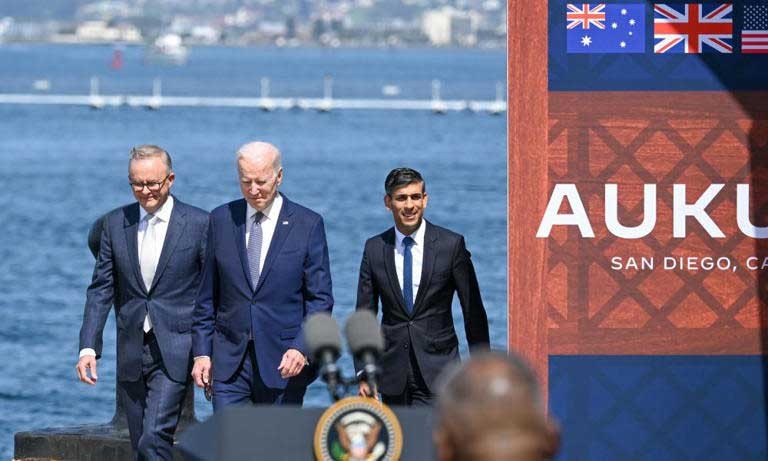Could a Donald Trump-shaped torpedo sink Australia’s $368bn Aukus submarine plans?
Story by Daniel Hurst • 13h ago - 15-3-2023
On a day of hoopla surrounding the Aukus unveiling in San Diego, perhaps the most revealing moment occurred during a press conference 12,000km away in Canberra.
Given that Australia’s multi-decade plan to gain nuclear-powered submarines will require the support of successive US administrations, a reporter asked the Australian defence minister, Richard Marles, a very direct question on Tuesday: “Are you concerned that a future US president will tear it up?”
The answer was not immediate. He took a deep breath and paused for eight seconds before settling on the response: “Well – I’m not – is the answer to your question.”
Perhaps it was just the fact that Marles was up before the crack of dawn to sell a project that carries the eye-watering price tag of as much as $368bn between now and the 2050s. But the pause seemed to betray an understanding of just one of many risks surrounding the Aukus gambit, which also requires ongoing British support under the three-country deal.
Marles is a strong supporter of the US alliance – and is no “Manchurian candidate” as he was cartoonishly portrayed before the 2022 election – but he is on the record as having aired some concerns in the past about the superpower’s commitment to the Indo-Pacific.
It was not just an increasingly assertive China that was fuelling the most challenging strategic outlook for Australia since the second world war, Marles wrote in his 2021 book, Tides That Bind.
It was also an “unpredictable” US, he wrote then, that posed difficulties for its allies in the region. “There is a question mark over the future role of the US both in East Asia and globally,” Marles wrote.
That followed a tumultuous period marked by Donald Trump’s “America First” rhetoric, in which the then US president was openly sceptical of alliances and demanded Japan and South Korea shoulder more of the burden. Trump also abandoned a key regional trade agreement, which would have been a signal of enduring American economic engagement with the region. That deal, known then as the Trans-Pacific Partnership, was meant to set the “rules of the road” rather than leaving it to China to do so; now China wants to join the rebadged CPTPP.
Fast forward to today, and Marles is now the deputy prime minister and defence minister in an Australian Labor government that is making a big bet in the face of that uncertainty. He is reassured by the approach taken by Joe Biden’s administration – but maybe the only sure thing in Aukus is that it will reach its peak in the post-Biden era.
Marles told reporters on Tuesday the US alliance had “thrived under successive administrations and governments” and he believed Aukus would similarly be “an enduring arrangement”. Citing strong support in the US congress, he added: “Across the political spectrum, there is complete support for the relationship with Australia and the Aukus arrangements, so we enter this with a high degree of confidence.”
Story by Daniel Hurst • 13h ago - 15-3-2023
On a day of hoopla surrounding the Aukus unveiling in San Diego, perhaps the most revealing moment occurred during a press conference 12,000km away in Canberra.
Given that Australia’s multi-decade plan to gain nuclear-powered submarines will require the support of successive US administrations, a reporter asked the Australian defence minister, Richard Marles, a very direct question on Tuesday: “Are you concerned that a future US president will tear it up?”
The answer was not immediate. He took a deep breath and paused for eight seconds before settling on the response: “Well – I’m not – is the answer to your question.”
Perhaps it was just the fact that Marles was up before the crack of dawn to sell a project that carries the eye-watering price tag of as much as $368bn between now and the 2050s. But the pause seemed to betray an understanding of just one of many risks surrounding the Aukus gambit, which also requires ongoing British support under the three-country deal.
Marles is a strong supporter of the US alliance – and is no “Manchurian candidate” as he was cartoonishly portrayed before the 2022 election – but he is on the record as having aired some concerns in the past about the superpower’s commitment to the Indo-Pacific.
It was not just an increasingly assertive China that was fuelling the most challenging strategic outlook for Australia since the second world war, Marles wrote in his 2021 book, Tides That Bind.
It was also an “unpredictable” US, he wrote then, that posed difficulties for its allies in the region. “There is a question mark over the future role of the US both in East Asia and globally,” Marles wrote.
That followed a tumultuous period marked by Donald Trump’s “America First” rhetoric, in which the then US president was openly sceptical of alliances and demanded Japan and South Korea shoulder more of the burden. Trump also abandoned a key regional trade agreement, which would have been a signal of enduring American economic engagement with the region. That deal, known then as the Trans-Pacific Partnership, was meant to set the “rules of the road” rather than leaving it to China to do so; now China wants to join the rebadged CPTPP.
Fast forward to today, and Marles is now the deputy prime minister and defence minister in an Australian Labor government that is making a big bet in the face of that uncertainty. He is reassured by the approach taken by Joe Biden’s administration – but maybe the only sure thing in Aukus is that it will reach its peak in the post-Biden era.
Marles told reporters on Tuesday the US alliance had “thrived under successive administrations and governments” and he believed Aukus would similarly be “an enduring arrangement”. Citing strong support in the US congress, he added: “Across the political spectrum, there is complete support for the relationship with Australia and the Aukus arrangements, so we enter this with a high degree of confidence.”
3 yr. ago


